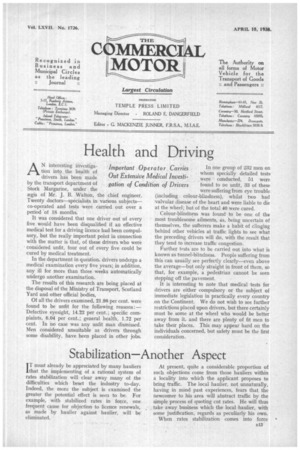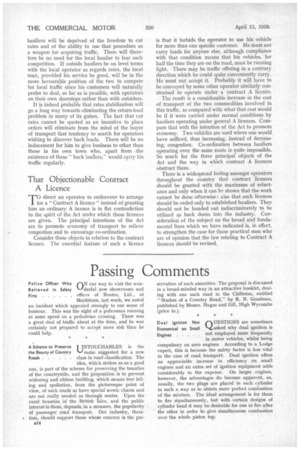Stabilization Another Aspect
Page 23

Page 24

If you've noticed an error in this article please click here to report it so we can fix it.
I T must already be appreciated by many hauliers that the implementing of a rational system of rates stabilization will clear away many of the difficulties which beset the industry to-day. Indeed, the more the subject is examined the greater the potential effect is seen to be. For example, with stabilized rates in force, one frequent cause for objection to licence renewals, as made by haulier against haulier, will be eliminated. At present, quite a considerable proportion of such objections come from those hauliers within a locality into which the applicant proposes to bring traffic. The local haulier, not unnaturally, having in mind past experiences, fears that the newcomer to his area will abstract traffic by the simple process of quoting cut rates. He will thus take away business which the local haulier, with some justification, regards as peculiarly his own.
When rates stabilization comes into force hauliers will be deprived of the freedom to cut rates and of the ability to use that procedure as a weapon for acquiring traffic. There will therefore be no need for the local haulier to fear such competition. If outside hauliers be on level terms with the local operator as regards rates, the local man, provided his service be good, will be in the more favourable position of the two to compete for local traffic since his customers will naturally prefer to deal, so far as is possible, with operators on their own doorsteps rather than with outsiders.
It is indeed probable that rates stabilization will go a long way towards eliminating the return-load problem in many of its guises. The fact that cut rates cannot be quoted as an incentive to place orders will eliminate from the mind of the buyer of transport that tendency to search for operators wishing to discover back loads. There will be no inducement for him to give business to other than those in his own town who, apart from -the existence of these "back loaaers," would carry his traffic regularly.
That Objectionable Contract A Licence
-ro direct an operator to endeavour to arrange for a "Contract A licence" instead of granting him an ordinary A licence is in flat contradiction to the spirit of the Act under which these licences are given. The principal intentions of the Act are to promote economy of transport to relieve congestion and to encourage co-ordination.
Consider these objects in relation to the contract licence. The essential feature of such a licence is that it forbids the operator to use his vehicle for more than one specific customer. He must-not carry loads for anyone else, although compliance with that condition means that his vehicles, -for half the time they are on the road, must be running light. There may be traffic offering in a contrary direction which he could quite conveniently carry. He must not accept it. Probably it will have to be conveyed by some other operator similarly constrained to operate under a contract A licence.
The result is a considerable increase in the cost of transport of the two commodities involved in this traffic, as compared with what that cost would be if it were carried under normal conditions by hauliers operating under general A licences. Compare that with the intention of the Act to promote economy. Two vehicles are used where one would have sufficed, thus increasing, instead of decreasing; congestion. Co-ordination between hauliers operating over the same route is quite impossible. So much for the three principal objects of the Act and the way in which contract A licences obstruct them.
There is a widespread feeling amongst operators throughout the country that contract licences should be granted with the maximum of reluctance and only when it can be shown that the work cannot be done otherwise-: also that such licences should be ceded only to established hauliers. They should not be handed out indiscriminately to be utilized as back doors into the industry. Consideration of the subject on the broad and fundamental lines which we have indicated is, in effect, to strengthen the case for those practical men who are of opinion that the law relating to Contract A licences should be revised.




















































































